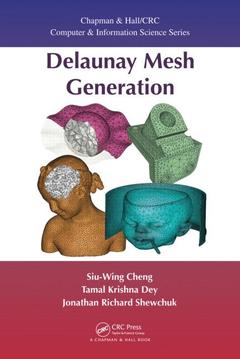Delaunay Mesh Generation Chapman & Hall/CRC Computer and Information Science Series
Auteurs : Cheng Siu-Wing, Dey Tamal K., Shewchuk Jonathan

Written by authors at the forefront of modern algorithms research, Delaunay Mesh Generation demonstrates the power and versatility of Delaunay meshers in tackling complex geometric domains ranging from polyhedra with internal boundaries to piecewise smooth surfaces. Covering both volume and surface meshes, the authors fully explain how and why these meshing algorithms work.
The book is one of the first to integrate a vast amount of cutting-edge material on Delaunay triangulations. It begins with introducing the problem of mesh generation and describing algorithms for constructing Delaunay triangulations. The authors then present algorithms for generating high-quality meshes in polygonal and polyhedral domains. They also illustrate how to use restricted Delaunay triangulations to extend the algorithms to surfaces with ridges and patches and volumes with smooth surfaces.
For researchers and graduate students, the book offers a rigorous theoretical analysis of mesh generation methods. It provides the necessary mathematical foundations and core theoretical results upon which researchers can build even better algorithms in the future.
For engineers, the book shows how the algorithms work well in practice. It explains how to effectively implement them in the design and programming of mesh generation software.
Introduction. Two-Dimensional Delaunay Triangulations. Algorithms for Constructing Delaunay Triangulations. Three-Dimensional Delaunay Triangulations. Algorithms for Constructing Delaunay Triangulations in R3. Delaunay Refinement in the Plane. Voronoi Diagrams and Weighted Complexes. Tetrahedral Meshing of PLCs. Weighted Delaunay Refinement for PLCs with Small Angles. Sliver Exudation. Refinement for Sliver Exudation. Smooth Surfaces and Point Samples. Restricted Delaunay Triangulations of Surface Samples. Meshing Smooth Surfaces and Volumes. Meshing Piecewise Smooth Complexes. Bibliography. Index.
Siu-Wing Cheng is a professor in the Department of Computer Science and Engineering at the Hong Kong University of Science and Technology. Professor Cheng is an advisory committee member of the International Symposium on Algorithms and Computation and a board member of the Asian Association for Algorithms and Computation. His research interests include computational geometry, mesh generation, manifold reconstruction, and algorithms. He earned a Ph.D. in computer science from the University of Minnesota, Twin Cities.
Tamal K. Dey is a professor of computer science at Ohio State University, where he leads the Jyamiti group, which develops software such as the well-known Cocone software for surface reconstruction and DelPSC software for mesh generation. He previously held faculty positions at Indiana University-Purdue University and IIT Kharagpur and research positions at the University of Illinois and Max-Planck Institute. His research interests include computational geometry and topology and their applications in graphics and geometric modeling. He earned a Ph.D. from Purdue University.
Jonathan Shewchuk is a professor in the Department of Electrical Engineering and Computer Sciences at the University of California, Berkeley. He is best known for his Triangle software for high-quality triangular mesh generation, which won the 2003 James Hardy Wilkinson Prize in Numerical Software, and his paper "Introduction to the Conjugate Gradient Method without the Agonizing Pain." He received his Ph.D. in computer science from Carnegie Mellon University.
Date de parution : 01-2013
Ouvrage de 352 p.
17.8x25.4 cm
Thèmes de Delaunay Mesh Generation :
Mots-clés :
Radius Edge Ratios; Local Feature Size; algorithms research; Delaunay Refinement Algorithm; Delaunay Mesh Generation; Weighted Delaunay Triangulations; Delaunay meshers and complex geometric domains; Delaunay Refinement; volume and surface meshes; Steiner Triangulation; meshing algorithms; Constrained Delaunay Triangulation; Delaunay triangulations; Voronoi Cell; polygonal and polyhedral; Vertex Inserted; surfaces with ridges and patches; Vertex Weight; volumes with smooth surfaces; Delaunay Triangulation; mesh generation software; Linear Cells; sliver tetrahedra; Restricted Delaunay Triangulation; computational geometry; Topological Disk; Delaunay Subdivision; Incremental Insertion Algorithm; Dihedral Angles; Convex Hull; Voronoi Edge; Skinny Triangle; Edge Flips; Conflict Graph; Bowyer Watson Algorithm; Topological Interval; Delaunay Tetrahedralization



